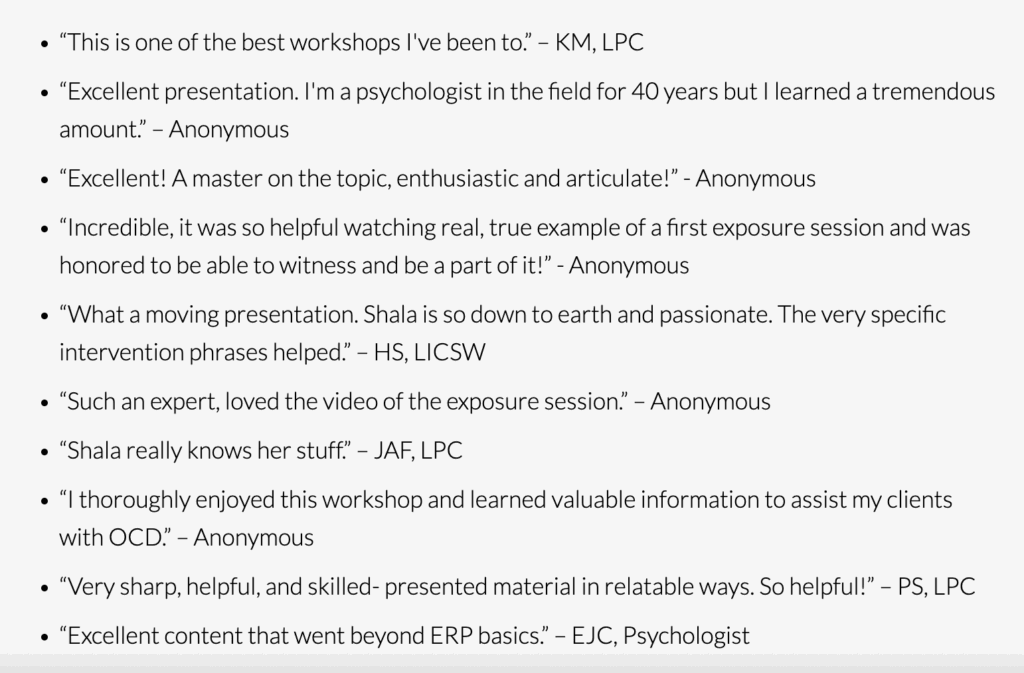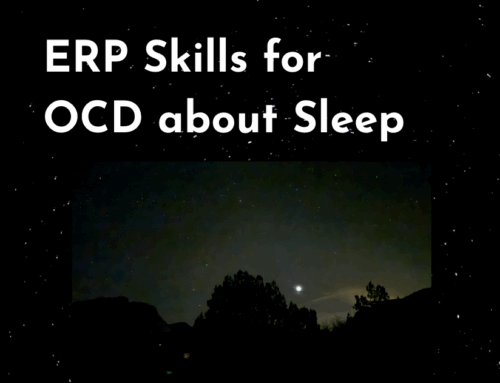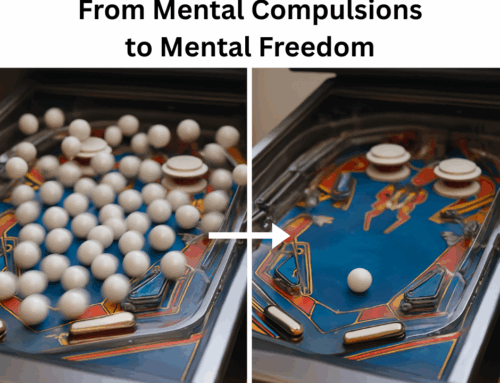📌 Quick takeaways
- Asking “what was helpful or not helpful?” creates insight and reinforces learning
- Positive reflections help counter OCD’s tendency to focus on failure
- Negative reactions can reveal OCD’s objections in disguise
- Separating yourself from OCD’s voice builds insight and momentum
- Tracking your takeaways and wins helps anchor your progress over time
⏱ Estimated reading time: ~3–4 minutes
If you’ve ever worked with me for ERP therapy for OCD, you know there’s something I ask at the end of every session:
“What did you like or not like about today’s session?”
or
“What was helpful or not helpful about this session?”
It might sound like a simple reflection, but this two-part question has become a powerful therapeutic tool in my work with clients. It’s also something you can use in your own ERP practice to boost your progress and insight.
A team approach
One reason I ask these questions is to remind my clients that we’re a team. Therapists and clients are collaborators—equal participants—in the work of reducing OCD’s influence and reclaiming clients’ lives from the disorder. For me to be the most effective teammate, I need honest feedback: what’s working, what’s not, what’s resonating, what feels off.
That kind of feedback helps me adjust, pivot, and tailor treatment in real time. But more importantly, it helps clients build self-awareness, a skill that’s essential for long-term recovery.
What was helpful: reinforcing success at doing effective ERP
When clients reflect on what they liked or found helpful in an OCD therapy session, it helps solidify what they’ve learned. That moment of naming the positive creates a stronger takeaway and gives them something to bring into their ERP homework during the week.
It also teaches something that OCD is really bad at: noticing success.
OCD loves to point out what’s wrong, what’s missing, what might go badly. That internal dialogue can drown out all the brave steps someone is taking. So when a client tells me something they found helpful or encouraging, it’s a small act of resistance against that OCD voice—and a big step toward self-compassion.
What was not helpful: listening for OCD
 Now here’s where it gets interesting.
Now here’s where it gets interesting.
The second part of the question—what wasn’t helpful or what they didn’t like—often holds gold. Sometimes the feedback is practical: “You summarized too much—I’d rather focus on skills,” or “I might need to come every other week.” Great! That helps us adjust.
But often, the “dislikes” come straight from OCD.
-
“I didn’t like that I have to want my anxiety—that doesn’t sound fun at all.”
-
“I didn’t like the idea of going toward my fears. That just feels dangerous.”
When I hear that, I don’t argue. Instead, I externalize the OCD:
“It sounds like your OCD really doesn’t like the idea of wanting anxiety. That makes sense—because when we want anxiety, that takes OCD’s power away.”
Or…
“That resistance to exposures? Sounds like classic OCD. It doesn’t want you moving toward your fears—it wants to keep you stuck.”
By naming OCD’s objections, we start to separate the client from the OCD. That’s where insight begins, and insight can give clients the clarity to do ERP, the evidence-based therapy for OCD, more effectively by helping them choose to do what’s important to them instead of OCD’s compulsions.
How you can use these questions to make ERP more effective
Whether you’re in OCD therapy or doing ERP practice on your own, try asking yourself the same questions after each session:
-
What did I like or not like about this therapy session/ERP practice session?
-
What was helpful or not helpful?
Then ask yourself a third:
How much of my answer came from me—and how much came from OCD?
That last one is key. When you start identifying OCD’s voice versus your own, you build a powerful recovery tool of externalizing and personifying OCD.
And if you want to take it a step further, try this:
-
Keep a notes file with what you’re learning each time—things you want to remember about how ERP works for you.
-
Create a “Wins” file with all the ways you’ve succeeded in therapy, no matter how small. OCD will try to make you forget, but your Wins file will help you remember: you are succeeding in doing hard things.
The more you reflect, the more you learn. The more you learn, the more effective your ERP can become. And the more you can separate yourself from OCD’s objections, the more you can reclaim your life.
So next time you finish a session—ask yourself what worked and what didn’t. And don’t be surprised if some of the answers come from OCD trying to slow you down.
You don’t have to listen.
Learn more about the subtleties of taming OCD
This blog post expanded upon a topic I taught in my workshop Mastering the Subtleties of ERP for OCD: Preparing Your Clients for Success. Why subtleties? Because OCD is clever. And often, real freedom from the disorder lies in the small things OCD is hoping you won’t notice, like how you respond to discomfort, approach exposures, or reflect on progress. The recording of the workshop, which 100% of the live participants said they would recommend to others, is available from The Knowledge Tree. Therapists can earn 6 CEUs, and it’s also open to anyone who has OCD or wants to learn more.
To learn more about how I personified OCD as part of my own ERP therapy, see Is Fred in the Refrigerator? Taming OCD and Reclaiming My Life. Click here to purchase your copy.
Sign up for my Shoulders Back! newsletter to receive OCD-taming tips & resources, including notifications of new FredTalks, delivered every month to your inbox.
My blogs are not a replacement for therapy, and I encourage all readers who have obsessive compulsive disorder to find a competent ERP therapist. See the IOCDF treatment provider database for a provider near you. And never give up hope, because you can tame OCD and reclaim your life!








Leave A Comment